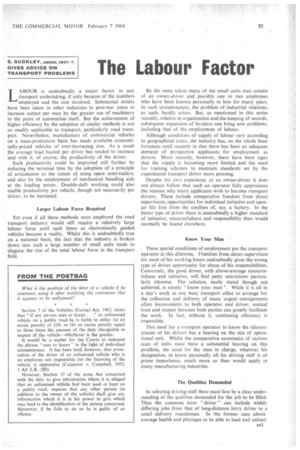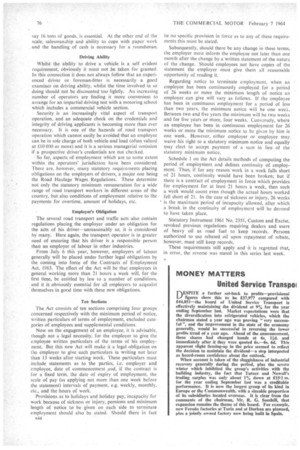The Labour Factor
Page 77

Page 78

If you've noticed an error in this article please click here to report it so we can fix it.
LABOUR is undoubtedly a major factor in any transport undertaking, if only because of the numbers employed and the cost involved. Substantial strides have been taken in other industries in post-war years to increase output per man by the greater use of machinery to the point of automation itself. But the achievement of higher efficiency by the 'adoption of similar methods is not so readily applicable to transport, particularly road transport. Nevertheless, manufacture of commercial vehicles on a mass-production basis has made available economically-priced vehicles of ever-increasing size. As a result the average load hauled per driver has tended to increase and with it, of course, the productivity of the driver.
Such productivity could be improved still further by reducing the terminal time by the Adoption of a principle of articulation to the extent of using spare semi-trailers, and also by the employment of mechanical handling aids at the loading points. Double-shift working could also enable productivity per vehicle, though not necessarily per driver, to be increased.
Larger Labour Force Required Yet even if all these methods were employed the road transport industry would still require a relatively large labour force until such times as electronically guided vehicles became a reality. Whilst this is undoubtedly true on a national basis, the fact that the industry is broken down into such a large number of small units tends to disguise the size of the total labour force in the transport field.
By the same token many of the small units may consist of an owner-driver and possibly one or two employees who have been known personally to him for many years. In such circumstances, the problem of industrial relations, as such, hardly arises. But, as mentioned in this series recently, relative to organization and the keeping of records, subsequent expansion of business can bring new problems, including that of the employment of labour.
Although conditions of supply of labour vary according to geographical areas, the industry has, on the whole been fortunate until recently in that there has been an adequate demand of prospective applicants for employment as drivers. More recently, however, there have been signs that the supply is becoming more limited and the need for training schemes to maintain standards set by the experienced transport driver more pressing.
Despite his own experience as an owner-driver it does not always follow that such an operator fully appreciates the reasons why many applicants wish to become transport drivers. These include comparative freedom from direct supervision, opportunities for individual initiative and openair life free from the confines of, say, a factory. In the better type of driver there is undoubtedly a higher standard of initiative, resourcefulness and responsibility than would normally be found elsewhere.
Know Your Man
These special conditions of employment put the transport operator in this dilemma. Freedom from direct supervision for most of his working hours undoubtedly gives the wrong type of driver opportunity for abuse of his responsibilities. Conversely, the good driver, with above-average resourcefulness and initiative, will find petty restrictions particularly irksome. The solution, easily stated though not achieved, is simply "know your man ". While it is all in a day's work in any busy transport office to arrange for the collection and delivery of many urgent consignments often inconvenient to both operator and driver, mutual trust and respect between both parties can greatly facilitate the work. In fact, without it, continuing efficiency is impossible.
This need for a transport operator to know the idiosyncracies of his drivers has a bearing on the size of operational unit. Whilst the comparative economics of various sizes of units must have a substantial bearing on this problem, the need for the man in charge, whatever his designation, to know personally all his driving staff is of prime importance, much more so than would apply in many manufacturing industries.
The Qualities Demanded In selecting driving staff there must first be a clear understanding of the qualities demanded for the job to be filled. Thus the common term " driver " can include widely differing jobs from that of long-distance lorry driver to a retail delivery roundsman. In the former case above average health and physique to be able to load and unload say 16 tons of goods, is essential. At the other end of the scale, salesmanship and ability to cope with paper work and the handling of cash is necessary for a roundsrnan.
Driving Ability Whilst the ability to drive a vehicle is a self evident requirement, obviously it must not be taken for granted. in this connection it does not always follow that an experienced driver or foreman-fitter is necessarily a good examiner on driving ability, whilst the time involved in so doing should not be discounted too lightly. An increasing number of operators arc finding it more convenient to arrange for an impartial driving test with a motoring school which includes a commercial vehicle section.
Security is an increasingly vital aspect of transport operation, and an adequate check on the credentials and integrity of driving applicants is becoming more than ever necessary. It is one of the hazards of road transport operation which cannot easily be avoided that an employee can be in sole charge of both vehicle and load (often valued at £10 000 or more) and it is a serious managerial omission if a prospective driver's credentials are not checked.
So far, aspects of employment which are to some extent within the operators' jurisdiction have been considered. There are, however, many statutory requirements placing obligations on the employers of drivers, a major one being the Road Haulage Wages Regulations. These determine not only the statutory minimum remuneration for a wide range of road transport workers in different areas of the country, but also conditions of employment relative to the payments for overtime, amount of holidays, etc.
Employer's Obligation
The several road transport and traffic acts also contain regulations placing the employer under an obligation for the acts of his driver—unreasonably so, it is considered by many. Here again, the transport operator is in greater need of ensuring that his driver is .a responsible person than an employer of labour in other industries.
From July 6 this year, however, employers of labour generally will be placed under further legal obligations by the coming into force of the Contracts of Employment Act, 1963. The effect of the Act will be that employees in general working more than 21 hours a week will, for the first time, be entitled by law to a number of conditions, and it is obviously essential for all employers to acquaint themselves in good time with these new obligations.
Ten Sections The Act consists of ten sections comprising four groups concerned respectively with the minimum period of notice, written particulars of terms of employment, excluded categories of employees and supplemental conditions.
Now on the engagement of an employee, it is advisable, though not a legal necessity, for the employer to give the employee written particulars of the terms of his employment. But this new Act will make it a legal obligation on the employer to give such particulars in writing not later than 13 weeks after starting work. These particulars must include statements as to the parties, i.e. employer and employee, date of commencement and,' if the contract is for a fixed term, the date of expiry of employment, the scale of pay (as applying not more than one week before the statement) intervals of payment, e.g. weekly, monthly, etc., and the hours of work.
Provisions as to holidays and holiday pay, incapacity for work because of sickness or injury, pensions and minimum length of notice to be given on each side to terminate employment should also be stated. Should there in fact a44 be no specific provision in force as to any of these requirements this must be stated.
Subsequently, should there be any change in these terms, the employer must inform the employee not later than one month after the change by a written statement of the nature of the change. Should employees not have copies of the statement the employer must give them all reasonable opportunity of reading it.
Regarding notice to terminate employment, when an employee has been continuously employed for a period of 26 weeks or more the minimum length of notice an employer can give will vary as follows. If the employee has been in continuous employment for a period of lessthan two years, the minimum notice will be one week. Between two and five years the minimum will be two weeks and for five years or more, four weeks. Conversely, where an employee has been in continuous employment for 26' weeks or more the minimum notice to be given by him is one week. However, either employer or employee may, waive his right to a statutory minimum notice and equally may elect to accept payment of a sum in lieu of the statutory minimum notice.
Schedule I on the Act details methods of computing the period of employment and defines continuity of employment. Thus, if for any reason work in a week falls short of 21 hours, continuity would have been broken; but if there is a contract of employment in force which provides for employment for at least 21 hours a week, then such a week would count even though the actual hours worked fell short of 21. In the case of sickness or injury, 26 weeks ' is the maximum period of incapacity allowed, after which a break in the continuity of employment will be deemed to have taken place.
Statutory Instrument 1961 No. 2351, Custom and Excise, revoked previous regulations requiring dealers and users of heavy oil as road fuel to keep records. Persons authorized to use rebated oil upon repayment of rebate, however, must still keep records.
These requirements still .apply and it is regretted that, in error, the reverse was stated in this series last week.




















































































































